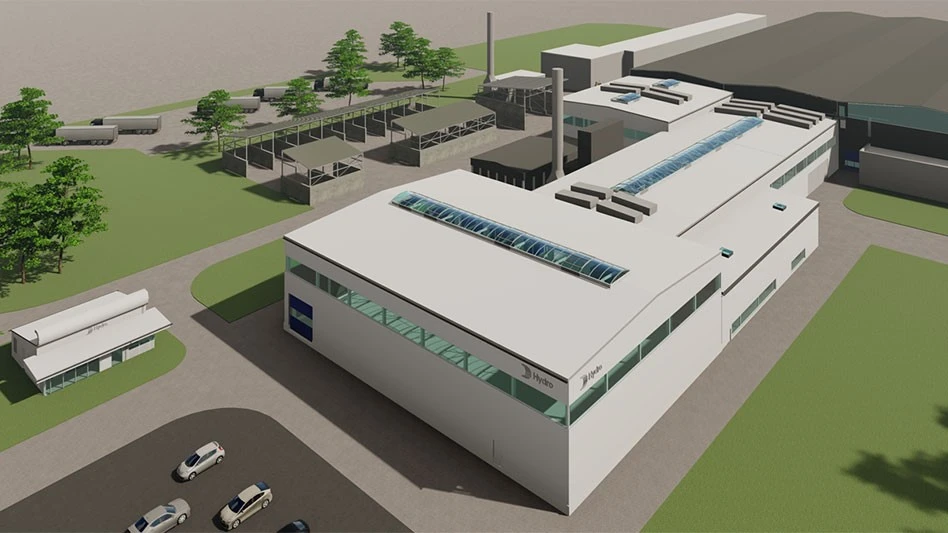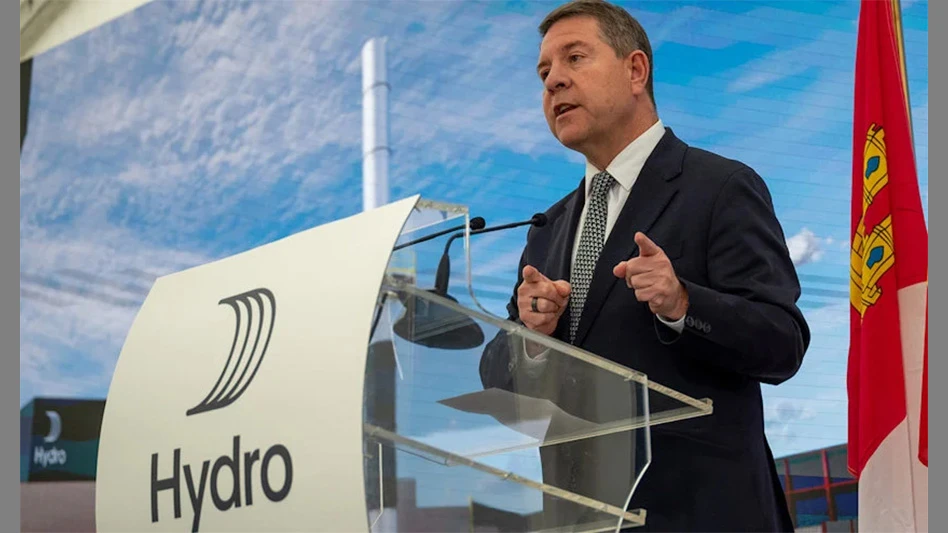
Illustration courtesy of Hydro
Norsk Hydro ASA, an aluminum producer headquartered in Norway, has announced that it has broken ground this week on construction to expand its aluminum recycling plant in Rackwitz, Germany. The 40-million-euro ($40.6 million) expansion will enable production of HyForge forge stock using postconsumer aluminum, according to the company.
Eivind Kallevik, executive vice president for Hydro Aluminum Metal, says, “With more automotive customers putting emphasis on sustainability, we are taking this breakthrough step at Rackwitz to produce aluminum HyForge products, resulting in even smaller diameter billets while ensuring a best-in-class climate footprint through using a high share of postconsumer scrap in the process. The business case shows that it is not only profitable, but it also has an important sustainability dimension, and it brings us closer to reaching our ambitious recycling targets.”
Forge stock is an aluminum billet with a smaller diameter than traditional billet and with higher surface quality.
HyForge billets can be forged into safety-critical automotive parts, including wheel suspension parts, straight after delivery from Hydro’s casthouses. This means that the number of processing steps from casthouse to automotive part are greatly reduced, leading to cost efficiency and higher product quality compared with traditional processes, Hydro says.
See related: Hydro breaks ground on Michigan plant
Hydro says the Rackwitz expansion is an important contributor to reaching its target of doubling its use of postconsumer aluminum scrap by 2025 from roughly 250,000 metric tons to more than 500,000 metric tons per year and to increasing its annual recycling earnings before interest, taxes, depreciation and amortization (EBITDA) by a range of 700 million to 1.1 billion Norwegian kroner ($69 million to $10.9 million) by 2025.
The company’s plans have the new facility operational by end of the first quarter 2023 and include hiring 20 new employees, bringing total employment at the site to 90 people. It will serve automotive customers with smaller diameter, high-quality billets that can be forged directly into high-quality automotive components, Hydro says. The plant, which currently produces about 95,000 metric tons of extrusion ingot per year, will produce an additional 25,000 metric tons of HyForge and increase postconsumer scrap recycling.
The HyForge volumes will complement the volumes already being produced at Hydro's aluminum plant in Husnes in western Norway.
With the high share of postconsumer scrap in HyForge billet, it will have a guaranteed CO2 footprint of less than 4 kilograms per kilo of aluminum, which is less than 25 percent of the global average for primary aluminum, Hydro says.
“We have a strong collaboration and partnership with the automotive industry and, with the introduction of HyForge, our position as a preferred partner will only get stronger,” says Thomas Stuerzebecher, managing director, Hydro Aluminum Metal Rackwitz. “Our Rackwitz plant is located close to Hydro’s key automotive customers and scrap sources. Together with the HyForge product, this is an ideal fit when it comes to the high-quality standards and rapidly increasing focus on sustainability in the automotive industry.”
See related: Hydro finds automotive home for Circal aluminum
Sponsored Content
Labor that Works
With 25 years of experience, Leadpoint delivers cost-effective workforce solutions tailored to your needs. We handle the recruiting, hiring, training, and onboarding to deliver stable, productive, and safety-focused teams. Our commitment to safety and quality ensures peace of mind with a reliable workforce that helps you achieve your goals.
With the automotive industry putting emphasis on lightweighting and sustainability for several decades, use of aluminum has grown because of its light weight, mechanical properties, corrosion resistance and its processing possibilities. Aluminum plays a significant role in lightweighting electric and hybrid vehicles because the vehicles need less electricity and fewer or smaller batteries to travel the same distances, Hydro adds.
Get curated news on YOUR industry.
Enter your email to receive our newsletters.
Latest from Recycling Today
- Toppoint Holdings expands chassis fleet
- Lego creates miniature tire recycling market
- Lux Research webinar examines chemical recycling timetables
- Plastics producer tracks pulse of wire recycling market
- Republic Services, Blue Polymers open Indianapolis recycling complex
- Altilium produces EV battery cells using recycled materials
- Brightmark enters subsidiaries of Indiana recycling facility into Chapter 11
- Freepoint Eco-Systems receives $50M loan for plastics recycling facility








